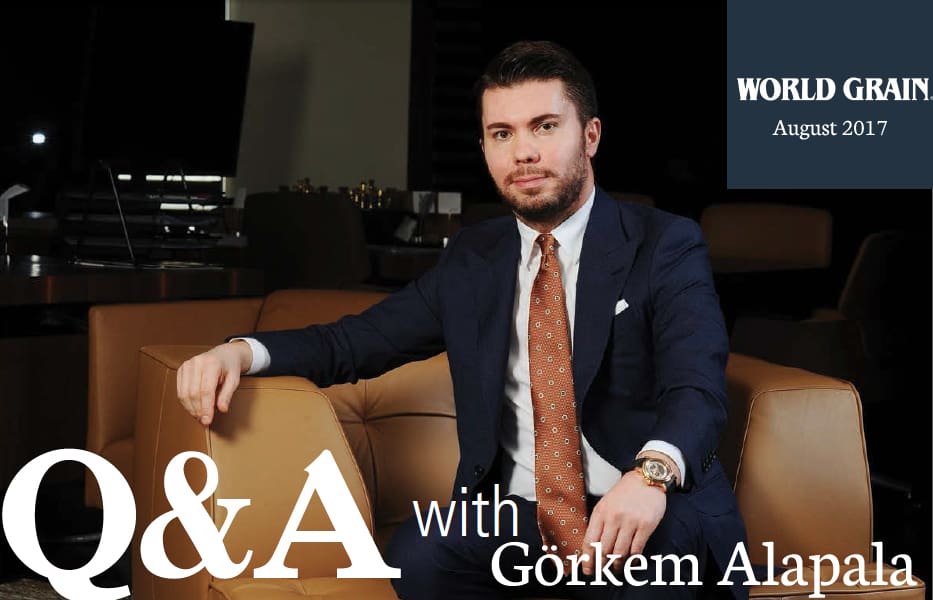

Construction work on a flour mill in Corum, Turkey, in 1961 launched the early beginnings of the Alapala Group. After being actively involved in construction of that mill, Mehmet Alapala started manufacturing plansifters. He sold the sifters to factories all over Turkey, and Alapala Machine was born. Later, Mehmet Alapala with his sons Nurettin and Ismail Alapala, started manufacturing all the machinery needed for a flour mill and turnkey mills. Alapala Machine is the oldest and best-known company of the Alapala Group. It builds turnkey plants and is one of the top 500 exporters in Turkey with 95% of its production leaving the country. Alapala has projects in more than 85 countries, and operates a state-of-the-art production facility in Corum, Turkey. World Grain recently visited with Gorkem Alapala, vice-chairman of the board, about the company’s experience, innovation and future plans.

WG:Tell us more about the products and services Alapala offers the milling industry.
Alapala:Alapala designs, engineers, builds and installs turnkey plants for grain milling such as hard and soft wheat, durum mills, maize mills, animal feed plants, rice mills,storage for raw materials and finished products and pre-engineered steel buildings. It provides the ideal competitive and technological advanced industrial solutions, which are required by each individual customer’s market requirements. This goes in hand with the right know-how and the vast experience that Alapala has gathered over 62 years.
WG:Alapala recently completed an expansion at its Corum, Turkey, headquarters. What was included in this expansion and how will it help the company respond to customers’ needs?
Alapala:With its expansion to 50,000 square meters, the company now employs 500 people and is equipped with the most modern CNC machine tools, robotic assembly and welding systems and a state-of-the-art, environmentally friendly painting system. New production and assembly systems have been put in place to ensure increased production together with enhanced quality. Careful thought has gone into ensuring an environmentally friendly and safe working atmosphere. The R&D facilities have also been expanded and enhanced with employment of new engineers and designers. With this new investment, Alapala will be able to develop new products and cater to the present and future market requirements needs.
WG:Alapala has partnered with Satake for the rebirth of the Henry Simon milling equipment. What is Alapala’s role in this partnership and what is the significance of bringing these products back to market? What are the future plans for this line?
Alapala:Alapala and Satake have worked together over many years and the companies decided to increase their cooperation further by jointly bringing back the legendary iconic brand, Henry Simon. Both the companies were related to Henry Simon in the past, Satake having purchased Henry Simon 22 years ago and Alapala having worked for Henry Simon in Turkey 60 years ago. Henry Simon has an immense potential and a bright future. Both Alapala and Satake are committed to making the Henry Simon brand a leader in the sector as it was before.
WG:Tell us more about Feedtech, Alapala’s feed milling brand, and what it offers the feed industry?
Alapala:Alapala Group has created the Alapala Feedtech brand for the design, manufacture and build of turnkey animal feed milling plants for all kind of animal feed production. Alapala expanded its expertise in feed milling machinery by becoming the commercial agent of CPM Europe (California Pellet Mill Company). Alapala manufactures animal feed machines under the Alapala Feedtech brand in its factory such as the hammermills, mixers, micro dosing units, oil dosing systems, molasses mixers, feeder-conditioners, pellet mills, coolers, crumblers, sieves, oil coating units, bagging scales, bucket elevators, conveyors, gates, divertors etc. These are the top-quality products thanks to their technological supremacy, durability and less maintenance.
WG:What are some of the challenges facing the milling industry? In which parts of the world are you seeing demand for milling equipment?
Alapala:As the world’s population rises, there will be more demand for food both for human and animal consumption, and for this reason the milling industry will sustain itself. The challenges it will face in our view will be developing new efficient technologies for the milling of local regional indigenous grains. Reduction in energy consumption will also play a great role. As the cost of energy increases, the cost of the milled products cannot be increased proportionately. Cost of investment in plants and machinery must be sustainable. Generally, we see a growth in the emerging markets where the eating habits are changing toward milled grain products.
WG:What are your customers demanding in terms of equipment design? How is Alapala meeting those demands?
Alapala:This depends from region to region and we cannot generalize the demands. For example, in the emerging markets like Africa our customers are demanding the latest technology with lower prices. Alapala has designed, developed and manufactured suitable plants and machinery for this particular requirement. To speak broadly, Alapala designs, develops and manufactures plants and machinery for any particular regional or market requirement.
WG:What are some milling projects that Alapala has recently completed?
Alapala:Thanks to our new facility and increased capacity, our production is faster than ever before. We built 20 turnkey projects a year, and only in the last six months we have completed projects in Zambia, Iraq, Uzbekistan, Philippines, Ghana and Turkey.
WG:Tell us about the importance of your corporate philosophy and social responsibility principles.
Alapala:Everyone in our organization understands that the most important strategy is to understand and satisfy the customer. Our focus is always with our customers and products. We work with our client to add value to their businesses.
By Susan Reidy